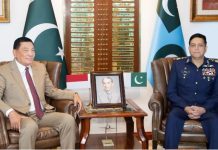Staff Report
ISLAMABAD: Local communities as stakeholders are an essential element for the success of a policy as they contribute to national cohesion and economic growth if given ownership and provided the right opportunities. This holds true for the coastal communities, and while acknowledging this aspect, Pakistan Navy follows a humanistic approach in its security strategy as evinced by various development projects based along the country’s coast.
This was highlighted by speakers at the book launch ceremony of Gwatar Bay to Sir Creek: The Golden Coast of Pakistan – History and Memoirs, authored by Vice Admiral Iftikhar Ahmed Rao (retd) and published by IPS Press, the publishing arm of Institute of Policy Studies (IPS). The event was organized jointly with National Institute of Maritime Affairs (NIMA).
The session was chaired by Admiral Mohammad Asif Sandila (retd), former Chief of Naval Staff, co-chaired by Khalid Rahman, Chairman IPS, and graced as guests of honor by Kanwal Shauzab, Parliamentary Secretary, Ministry of Planning Development & Special Initiatives, Admiral Muhammad Zakaullah (retd), former Chief of Naval Staff, Lt Gen Tahir Mahmud Qazi (retd) and Vice Admiral Abdul Aleem (retd), Director General NIMA.
The gathering was also addressed by Ambassador (retd) Khalid Mahmood, Chairman, Institute of Strategic Studies, Islamabad, Ammara Durrani, Assistant Resident Representative, Chief Development Policy Unit, UNDP and Ambassador (retd) Syed Abrar Hussain, Vice Chairman IPS.
The participants were of the view that the book provides insight into the latent human angle to Pakistan’s coastline; the development potential that has become critical for the politics and economics of the region. As such it is important to engage and empower the local population not just along the coast but all over the country for national security.
The book provides a number of pointers how to make this happen. It was observed that policy formulation is not a mechanical process and cannot be done in isolation to history and background. It must include consultations with stakeholders, as evident from various incidents shared in the book.
In this context, the speakers stated that amid the current negative narratives about Pakistan, the book depicts a success story that how the successive governments consistently worked for retrocession of Gwadar to Pakistan from Oman, which was finally achieved in 1958.
Reflecting on his rich experiences along the coastal belt, Admiral Rao shared several anecdotes from his book where he remained at the center of many development-related works, especially in solving a quandary of the fisherfolk in the Sir Creek region. This initiative culminated in the digging of the Marines Canal that continues to help the fishermen in gathering enough catch for sustainability while remaining safe.
The former Deputy Chief of Naval Staff (Operations) rued the prevailing sea-blindness in the country, albeit appreciating that gradually awareness about the issue is beginning to be raised through different steps taken by various research and academic institutions.
Admiral Sandila acknowledged that he got attuned to many historical facts by reading the book. He spoke highly of the quality of the references used in the book, while stating that the work also presents a vision for the coastline which can prove to be very beneficial for the country going forward.
Khalid Rahman signified the importance of such comprehensive work, especially for research and policy arenas, in the digital era where even the most experienced and significantly placed policy practitioners and key opinion leaders are compelled to express their views in a short manner. In such an environment, solid and sustainable policy-making should be based on reports and books that are factual and works of research and not just built on information gathered in real-time, he added.
Kanwal Shauzab called the book a reflection of the author’s 40 years of experience in the maritime domain, offering insightful geographic, economic, social and development perspectives of the region. She commended the author for an inspirational work written in a very simple, jargon-less language, thus making it an easy read for experts and newbies alike.












